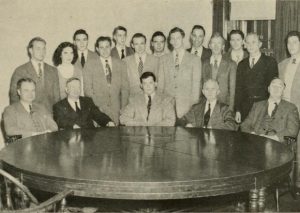
In the summer of 1945 UNC-CH accepted its first Japanese-American student, Shizuko Hayashi, largely thanks to the activism of UNC-CH historian Howard K. Beale. As part of a larger project to resettle Japanese-American college students during internment in World War II, Beale became deeply involved in lobbying the University to admit Japanese-American students who were no longer allowed to attend colleges in the West Coast “security zone.”
Born in Chicago in 1899, Beale first came to UNC-CH in 1935 after stints at New York University and Bowdoin College. An influential historian of Reconstruction, he challenged the then dominant Dunning School which championed white resistance to Reconstruction. He helped pioneer the revisionism of the 1930’s, which focused on economic interpretations of Reconstruction. While at Carolina, Beale trained C. Vann Woodward and wrote on academic freedom and imperialism.
As WWII erupted, Beale served as an advisor to conscientious objectors before becoming involved with efforts to help Japanese-American students. After Pearl Harbor, the U.S. government enforced the incarceration in camps for the duration of the war of over 100,000 people of Japanese ancestry living on the Pacific Coast, the majority of whom were U.S. citizens. Miles Fletcher, professor of history at UNC-CH, noted that shortly after FDR signed Executive Order 9066, which authorized the creation of “military zones” from which Japanese-Americans could be deported, Beale became committed to helping relocate students who were affected by internment. Japanese-American college students who attended school in the “military zones” were forced to leave their universities, inspiring the creation of the National Japanese-American Student Relocation Council (NJASRC) to help these students find universities they could attend outside of the West Coast. Once the Japanese-Americans were interned, Beale became involved in the NJASRC, leading him to San Francisco where he became the director of the organization’s West Coast branch.
With the support of the UNC-CH Department of History, Beale worked tirelessly in San Francisco, although his stint as director did not last long—he resigned after only two months. Professor Heidi Kim in the UNC-CH Department of English and Comparative Literature, who is currently researching Howard Beale, said that although “he was working extremely hard, let us say his leadership style did not work in the San Francisco office.” The NJASRC had strong ties to the American Friends Service Committee and was mostly staffed by Quakers. According to Kim, the West Coast office liked to start every morning with meditation—and Beale just couldn’t get on board with the “group ethos” style of leadership. While he was in San Francisco he worked unceasingly—he would spend all day on the job, break for dinner and perhaps take a walk, and then head back to work. Beale’s efforts did not stop once he left San Francisco.
After returning from his leave of absence, which Kim says Beale had secured by sending UNC-CH President Frank Porter Graham a telegram that, in effect, said, “I’d like to take this semester off, can you please fix it up?,” Beale continued his efforts to bring Japanese-American students to UNC-CH. With the support of Frank Porter Graham, who had taught in the Department of History at UNC-CH until 1930, and Reverend Charles Miles Jones, Beale worked against the “skeptical” faculty advisory committee and Dean Robert House. Finally, his efforts paid off. Shizuko Hayashi was admitted to UNC-CH in the summer of 1945 to pursue a master’s degree in social work. The only Japanese-American student at UNC-CH, Hayashi was joined in the spring of 1946 by Kayelise Kaneda, who came to work with Howard Odum in the Sociology Department.
In 1948, Beale left UNC-CH for the University of Wisconsin, where he spent the rest of his academic career until his death in 1959. In addition to his work supporting the resettlement of Japanese-American students, Beale was involved with numerous liberal causes throughout his life. He was active in the American Civil Liberties Union, served as director of the National Association for the Prevention of War, and remained a critic of government censorship. Reflecting on Beale’s activism during WWII, Professor Kim stressed that while Beale could certainly be difficult to work with at times, when reading his correspondence, “you can feel his conviction, and with that you can feel his frustration.” That conviction, and corresponding frustration, drove Beale in his academic and public endeavors at Carolina.
–Danielle Balderas
